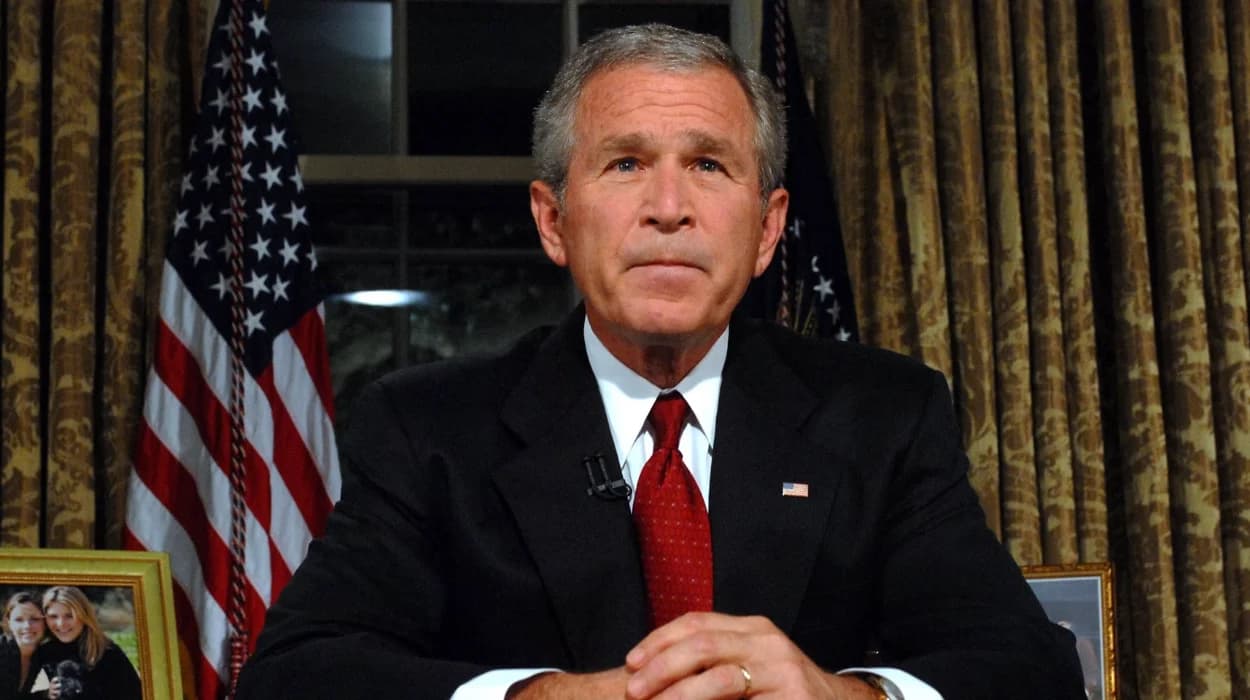George W. Bush served as the 43rd President of the United States from 2001 to 2009. His two terms in office were marked by significant domestic and international events that shaped the early 21st century.
Overview to George W. Bush’s Presidency
Inaugurated in January 2001, George W. Bush came into office with ambitious plans for domestic reform. However, his presidency was quickly dominated by the aftermath of the September 11 attacks, which shifted priorities to national security and foreign policy. His administration witnessed decisive but controversial actions, including wars in Afghanistan and Iraq, major tax reforms, and responses to economic crises.
Domestic Policies and Economic Landscape
Bush’s presidency began during an economic downturn spurred by the dot-com bubble burst. His administration focused on stimulating growth through significant tax cuts, notably the Economic Growth and Tax Relief Reconciliation Act and the Jobs and Growth Tax Relief Reconciliation Act. These efforts aimed to inject capital back into the economy by returning surpluses to taxpayers.
During his tenure, federal government spending increased sharply, rising by 66% from approximately $1.8 trillion to nearly $3 trillion. Defense spending more than doubled, reflecting heightened national security concerns. Despite these measures, the US faced economic challenges, including a recession beginning in 2007 influenced by a housing market correction and subprime mortgage crisis.
By the end of Bush’s terms, unemployment fluctuated initially rising to a peak of 6.3% but falling to 4.5% before climbing again to 7.2%. The Dow Jones Industrial Average saw significant volatility, peaking in 2007 before dropping substantially as the financial crisis unfolded.
Education and Healthcare Initiatives
One of Bush’s hallmark domestic programs was the No Child Left Behind Act, which introduced standardized testing and accountability measures aimed at bridging educational disparities. Though widely supported for raising educational standards, it also faced criticism over its heavy focus on testing.
Healthcare expanded notably with the enactment of the Medicare Prescription Drug, Improvement, and Modernization Act in 2003, which introduced prescription drug benefits to Medicare recipients. The bill represented the largest expansion of the US welfare state in decades but also added significant costs.
Bush’s administration also navigated controversies over the State Children’s Health Insurance Program (SCHIP), which the President vetoed over concerns about expanding government-funded healthcare.
Social Security and Social Services
Reforming Social Security became a major initiative during Bush’s second term. He proposed partial privatization and personal investment accounts to address projected deficits. Despite extensive campaigning, the plan faced strong opposition in Congress and from the public, ultimately failing to pass.
Medicare reforms and increased income security spending underscored this focus on social services, even as broader debates continued over the future sustainability of entitlement programs.
Foreign Policy and the Global War on Terror
The defining feature of Bush’s presidency was how it reshaped US foreign policy post-9/11. The administration launched military campaigns in Afghanistan to dismantle al-Qaeda and in Iraq based on allegations of weapons of mass destruction, which were later discredited.
Bush’s global strategy emphasized counterterrorism, homeland security enhancements, and building international coalitions. His visits abroad and diplomatic efforts sought to bolster alliances while addressing emerging threats.
The wars sparked profound domestic debates, impacted US relations worldwide, and influenced global security dynamics well beyond his presidency.
Environmental and Energy Policies
Bush’s stance on environmental issues was initially skeptical of international agreements such as the Kyoto Protocol, citing economic concerns. However, his administration enacted initiatives promoting clean energy research and created the largest marine reserve through the designation of the Papahānaumokuākea Marine National Monument.
Energy independence and alternative fuel development featured prominently in his addresses, supplemented by controversial moves like lifting restrictions on offshore drilling, aimed at reducing reliance on foreign oil.
Health Research and Biotechnology
Bush’s position on stem cell research divided public opinion. He supported adult stem cell research but limited federal funding for embryonic stem cell studies, unveiling a compromise that permitted research on existing stem cell lines but vetoed legislation expanding this funding.
His administration also increased funding for the National Institutes of Health and launched a national strategy for pandemic influenza preparedness, showing a proactive stance on public health.
Immigration Policy and Border Security
Immigration was a contentious issue under Bush, with proposals to legalize undocumented immigrants through guest-worker programs and comprehensive reforms. Despite efforts to build bipartisan consensus and push legislative packages, immigration reform ultimately stalled in Congress.
Meanwhile, the administration increased border security funding and deployed National Guard troops to strengthen the US-Mexico border.
Response to Natural Disasters: Hurricane Katrina
One of the most significant moments of Bush’s presidency was the federal response to Hurricane Katrina, which devastated the Gulf Coast in 2005. The aftermath exposed shortcomings in disaster preparedness and crisis management, leading to criticism of the administration’s handling of relief efforts.
President Bush’s visits to affected areas underscored the gravity of the disaster and its political ramifications throughout his second term.
Legacy
George W. Bush’s presidency was a period of transformation marked by responses to unprecedented events and policy shifts that affected domestic and international landscapes. While his administration faced criticism particularly over the Iraq War and economic recession his policies on education, healthcare, and security left enduring impacts.
His leadership during the War on Terror defined US foreign relations for years to come, shaping global security frameworks. Economically, his tenure saw ambitious tax reforms and spending increases, with mixed outcomes.
Understanding George W. Bush’s presidency requires balancing achievements with controversies to grasp the full scope of his influence on 21st-century America.

